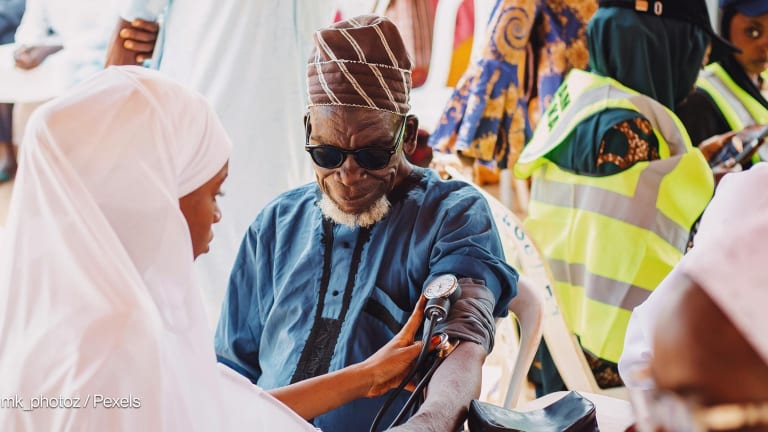
Whether it’s vaccines, children’s health or impact investing mechanisms, partnerships are absolutely critical nowadays to maximizing success and development impact.
At an event hosted Friday by Devex Impact at Pfizer’s New York headquarters, the conversation ranged from vaccine distribution and Ebola to impact investing layer cakes and the need for more knowledge sharing.
“We like to look at our contribution as beyond the vaccine,” said Susan Silbermann, Pfizer Vaccines president and general manager. “The more we can sit at the table as a whole partner and not just as the guy that makes the stuff … the more these public-private partnerships will flourish.”
Pfizer, she explained, is working to bring its expertise, as well as its ability to generate and review evidence and scientific knowledge to tackle key health issues around the world.
In their case, one of the main challenges is investing in the infrastructure for prevention, and part of that means figuring out how to design vaccines to reduce waste, storage space and the need for cold so they can get to that last mile distribution. Pfizer is currently awaiting review of a new vaccine that would have a three-day shelf life in temperatures above 40 degrees Celsius.
To complement some of those efforts, the Pfizer Foundation announced on Friday that it would be providing $2 million in grants to UNICEF, Save the Children, the International Rescue Committee and others to improve health care systems so children from remote areas in Ethiopia, Malawi, Rwanda, Uganda and Zambia can access vaccines. Some of the interventions that will be funded include mobile health solutions like solar-powered tablets for health workers, so they can register children, track vaccination schedules and monitor equipment through SMS to help improve supply chains.
Silbermann said the ongoing Ebola outbreak in West Africa can be a test of how partnership models can work.
“Everyone has to bring to the table what they can, whether it’s expertise, funding experimental vaccines, ideas, technology. This is really going to be the test of whether we can sit at the same table and do what we do best without pointing fingers at each other,” Silberman said.
Those partnerships are never easy as many in the impact investing world have learned.
In many cases, a fund requires so much work to bring the different sectors and pieces together that it can’t scale or replicate, noted Cathy Clark, director of the CASE i3 Initiative on Impact Investing and co-lead of the Social Entrepreneurship Accelerator at Duke.
“Do we need something simpler?” she asked.
Dealing with risk
Often the key is offering the right product that will appeal to the different investors, said Celia Wong, vice president for global social finance at Deutsche Bank.
The market, she explained, is changing. Early impact investors were not comfortable investing without 100 percent guarantees, but now banks and fund managers are willing to relieve them of that risk.
At Deutsche Bank, that means fund managers take on some of the risk as well — and their success fee will be tied to the investments hitting certain social outcomes as well as financial returns, Wong said.
One of the hardest things to do is expand these models, said Mitchell L. Strauss, special adviser to the Overseas Private Investment Corp.'s Socially Responsible Finance Group.
OPIC, she explained, is trying to enable products like protection and risk mitigants and collaborate across sectors so that in the future average consumers will be able to see social impact ratings along with financial ratings.
“It’s hard but we’ve had such incredible traction over just a few years,” Strauss said.
What is critical is that every sector, every player has a role to play. While government agencies like OPIC can provide products that reduce risk or give investor guarantees, there’s also a place for foundations and corporations.
Foundations can play a role by building impact investing ecosystems and making earlier stage risky investments to de-risk them for other investors, said Kate Ahern, vice president of social innovation at the Case Foundation.
The corporate can participate via corporate venture capital funds, where there is already some overlap through advance market commitments like Starbucks committing to buy a certain amount of coffee beans from a cooperative that is seeking an investment. But there is another way as well, Leung pointed out.
“Corporations are constantly doing R&D,” she said. “But what happens to those [ideas or products] that can be viable but are not aligned with the corporate’s own strategy?”
Those innovations, technologies and products could be a pipeline for the impact investing community, according to Leung, and that transfer of knowledge would require even greater coordination and partnership.
Join Devex, the largest online community for international development, to network with peers, discover talent and forge new partnerships — it’s free. Then sign up for the Devex Impact newsletter to receive cutting-edge news and analysis every month on the intersection of business and development.








